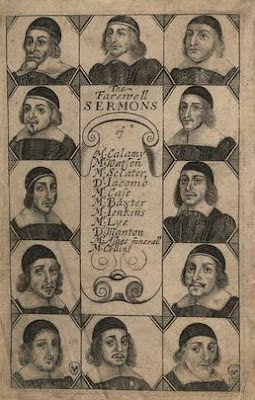Posted at This Day in Presbyterian History:
Suppose . . . just suppose now . . . that you as a minister, or your minister, had a certain time period to decide to renounce the ordination vows made at ordination, subscribe to a different set of doctrinal standards, promise to arrange the worship according to a different standard of worship, agree to be re-ordained by another ecclesiastical body, and do all this by a certain day, or be deposed by the spiritual authorities which had the approval of the government. Talk about change! And yet this was the way it was on this day in Presbyterian history, August 24, 1662 in the British Isles.
It was called officially The Act of Uniformity, 1662. Its longer title was “An Act for the Uniformity of Public Prayers and Administration of Sacraments and other Rites and Ceremonies and for the Establishing the Form of making, ordaining, and consecrating Bishops, Priests, and Deacons in the Church of England.” It was broken up into five actions; (1) to have a complete and unqualified assent to the newly published book of Common Prayer of the Church of England. (In passing, most preachers and people had not even seen this newly published book.) (2) to subscribe to the Thirty-Nine articles of the Church of England; (3) to renounce the Solemn League and Covenant; (4) To renounce any attempt to alter the government of the church or state; (5) to receive ordination at the hands of a bishop in the Church of England.
Combined with other acts of this Church, it excluded anyone who was not in compliance with the above from holding civil or military office. Students at Cambridge or Oxford would not receive any degrees from such study, if they refused this act.
And all this was to take place before August 24, which date was the celebration of St. Bartholomew Day. Students of church history remember, as they did then, that this was the day of the massacre in France when Huguenots were slaughtered by the Roman Catholics. So, this was a day remembered “Black” St. Bartholomew”s Day.
August 24: The Great Ejection (1662)
2000 Pastors Refused to CompromiseSuppose . . . just suppose now . . . that you as a minister, or your minister, had a certain time period to decide to renounce the ordination vows made at ordination, subscribe to a different set of doctrinal standards, promise to arrange the worship according to a different standard of worship, agree to be re-ordained by another ecclesiastical body, and do all this by a certain day, or be deposed by the spiritual authorities which had the approval of the government. Talk about change! And yet this was the way it was on this day in Presbyterian history, August 24, 1662 in the British Isles.
It was called officially The Act of Uniformity, 1662. Its longer title was “An Act for the Uniformity of Public Prayers and Administration of Sacraments and other Rites and Ceremonies and for the Establishing the Form of making, ordaining, and consecrating Bishops, Priests, and Deacons in the Church of England.” It was broken up into five actions; (1) to have a complete and unqualified assent to the newly published book of Common Prayer of the Church of England. (In passing, most preachers and people had not even seen this newly published book.) (2) to subscribe to the Thirty-Nine articles of the Church of England; (3) to renounce the Solemn League and Covenant; (4) To renounce any attempt to alter the government of the church or state; (5) to receive ordination at the hands of a bishop in the Church of England.
Combined with other acts of this Church, it excluded anyone who was not in compliance with the above from holding civil or military office. Students at Cambridge or Oxford would not receive any degrees from such study, if they refused this act.
And all this was to take place before August 24, which date was the celebration of St. Bartholomew Day. Students of church history remember, as they did then, that this was the day of the massacre in France when Huguenots were slaughtered by the Roman Catholics. So, this was a day remembered “Black” St. Bartholomew”s Day.
